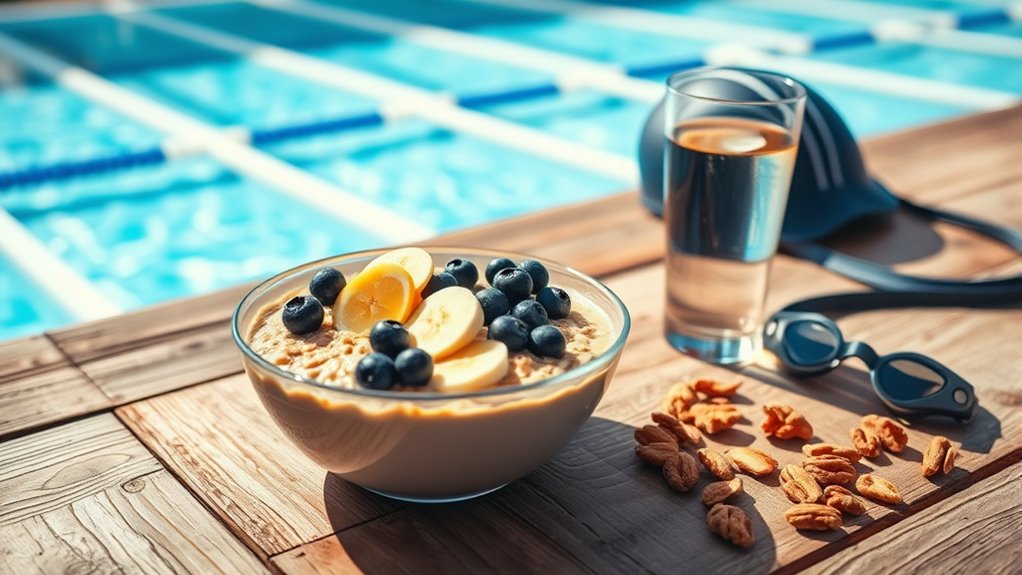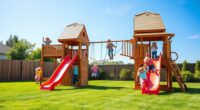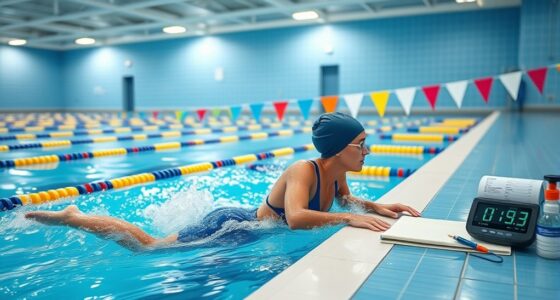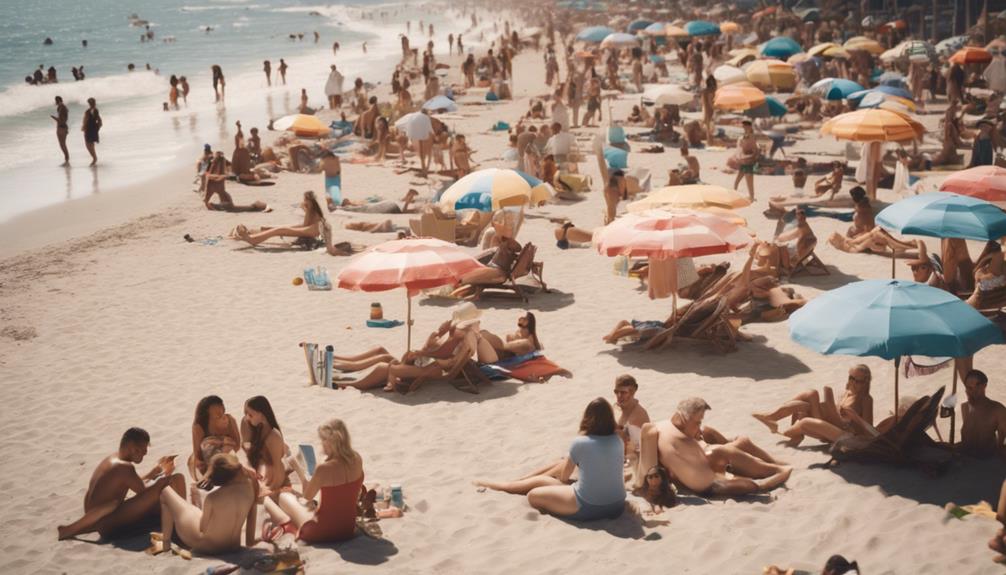To stay energized and support recovery on swim days, focus on proper nutrition and hydration. Eat a balanced meal with carbs, protein, and healthy fats about 2-3 hours before swimming. During your session, sip water or electrolyte drinks to stay hydrated. After swimming, replenish with nutritious foods like fruits and protein-rich meals within an hour to repair muscles and restore energy. Keep these tips in mind to optimize your performance and health throughout your swim days.
Key Takeaways
- Consume a balanced meal with carbs, protein, and healthy fats 2-3 hours before swimming for sustained energy.
- Hydrate consistently before, during, and after swim sessions to prevent dehydration and maintain stamina.
- Include nutrient-dense foods like fruits and vegetables to support recovery and overall health.
- Eat a carbohydrate and protein-rich snack within one hour post-swim to replenish glycogen and repair muscles.
- Avoid heavy or greasy foods close to swimming to prevent discomfort and optimize performance.
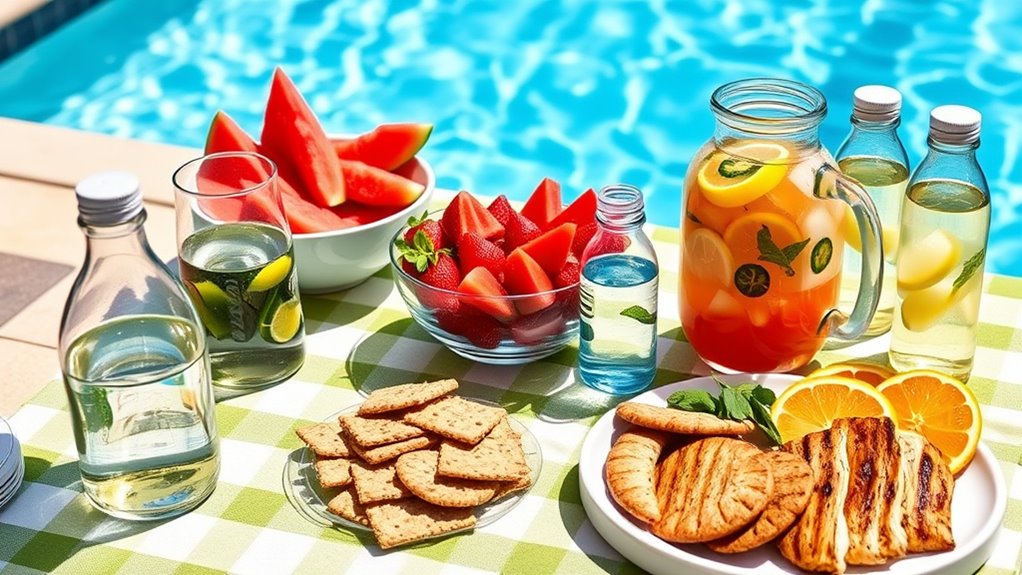
Have you ever wondered what it truly means to eat a balanced diet? When preparing for swim days, understanding how nutrition supports your performance is vital. One key aspect is hydration strategies. Proper hydration isn’t just about drinking water when you’re thirsty; it’s about consistently replenishing fluids before, during, and after your swim. Inadequate hydration can lead to fatigue, cramping, and decreased stamina, all of which hinder your ability to perform at your best. To optimize hydration, start your day with a glass of water, then sip fluids regularly leading up to your swim. During the activity, consider drinking small amounts of water or an electrolyte beverage to replace lost minerals and prevent dehydration. After swimming, continue hydrating to support recovery and muscle repair. Paying attention to hydration strategies helps maintain your energy levels, prevents overheating, and keeps your body functioning properly.
Another vital element is meal timing. When you eat in relation to your swim session can considerably impact your energy and recovery. Ideally, you want to consume a balanced meal about 2 to 3 hours before hitting the pool. This meal should include a mix of carbohydrates for energy, some protein to support muscle repair, and a small amount of healthy fats. Carbohydrates are your main fuel source, so including foods like whole grains, fruits, or vegetables ensures your muscles are stocked with glycogen, ready for activity. If you’re short on time, a light snack 30 to 60 minutes before swimming—like a banana with a spoonful of peanut butter or a small yogurt—can provide quick energy without causing discomfort. After your swim, aim to eat a meal within an hour to help replenish glycogen stores and repair muscles. This post-exercise meal should also include carbohydrates and protein, such as grilled chicken with brown rice and vegetables, or a smoothie with fruit and protein powder. Incorporating nutrient-dense foods like cranberry juice can also support your recovery and overall health. Proper meal timing guarantees your body has the nutrients it needs when it needs them most, enhancing recovery and preparing you for your next swim session.
Frequently Asked Questions
How Far in Advance Should I Eat Before Swimming?
You should eat a pre-swim meal or snack about 1 to 3 hours before swimming. This timing allows your body to digest and provides energy without feeling too full or sluggish. For ideal meal timing, opt for light, easily digestible pre-swim snacks if you’re closer to the 1-hour mark, and a more substantial meal if you have 2-3 hours. This helps you stay energized and comfortable during your swim.
Are Supplements Necessary for Swim Day Nutrition?
Supplements like energy gels and protein powders aren’t necessary for swim day, but they can boost your performance if you need quick energy or muscle support. You might find energy gels helpful during long sessions, and protein powders can aid recovery afterward. However, focus on balanced meals beforehand. Always test supplements in training first to verify they suit your body, and consult with a nutritionist if you’re unsure.
What Hydration Methods Are Best During Long Swim Sessions?
Ever wonder how to stay fueled during long swims? The best hydration methods include sipping water regularly, ideally before you feel thirsty, and maintaining electrolyte balance with sports drinks or electrolyte tablets. Focus on hydration timing—drink small amounts often, about every 15-20 minutes. This helps prevent dehydration and cramping, keeping you energized and performing at your best throughout the session. Remember, consistent hydration is key!
Can I Eat High-Fat Foods Before Swimming?
You can eat high-fat foods before swimming, but they may affect your performance. High-fat foods take longer to digest, which can cause discomfort or sluggishness during your swim. If you want ideal swimming performance, it’s better to focus on easily digestible carbs and moderate fats. Save high-fat foods for after your swim to support recovery and muscle repair. Listening to your body helps determine what works best for you.
How Do I Recover Nutrition After Intense Swim Workouts?
After intense swim workouts, you should prioritize post workout snacks and muscle recovery foods within 30-60 minutes. Consuming a mix of carbs and protein can boost glycogen stores and repair muscles—research shows this window maximizes recovery. Aim for options like a banana with peanut butter or a protein smoothie. These foods help you recover faster, reduce soreness, and prepare you for your next swim.
Conclusion
Remember, fueling your body properly on swim days boosts your energy and performance. Did you know that staying hydrated can improve your endurance by up to 20%? So, make sure you’re drinking plenty of water and eating balanced meals that include carbs, protein, and healthy fats. With the right nutrition, you’ll feel stronger, swim faster, and enjoy every splash. Keep these basics in mind, and you’ll be ready to make the most of your swim days!

